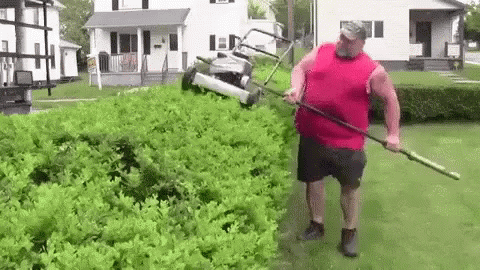
It’s that time of year…finally!!! It’s been a long winter and the residents are tired of being indoors. With the snow gone, the lawn and gardens are on full display. Are you happy with the landscaper? Many times, things do not go as planned with a landscaper. Promises are made to get you to sign that contract, but once signatures are obtained, it’s as if your 15 year old nephew could do a better job for $50.00. You feel trapped. You are in the middle of a long term contract and it is clear that things are not going to work, but you have no idea how to move on. Here are some tips and things to consider:
1. Do your homework before signing a contract. Ask for references and actually speak to the references. Your property manager is a great resource and has many companies that he/she has worked with and can be a wealth of information. Go and look at accounts that the landscaper is currently servicing. Do you like what you see? Do a google search and read reviews. It is clear that many disgruntled customers are ones that cannot be made happy, but if you are seeing a reoccurring theme in the complaints, there may be a ring of truth to the complaints. Do a search of the court website: www.jud.ct.gov to see if the landscaper has been sued before and why. Check to see if the licenses needed are valid. Did you know that fertilization requires a license?
2. The Contract: Please read it thoroughly and have your attorney review it. Each community is different as to what it needs with regard to landscaping. DO NOT BASE YOUR DECISION ON PRICE ALONE. Cheaper is not always better. Long term contracts are risky. You may want to do a short term contract with a new provider to make sure he/she is going to work out and minimize the time you need to deal with him/her if things go south. A few things to look out for in landscaping contracts:
a. Automatic renewal clauses: many contracts contain language that allows the contract to automatically renew with a percentage increase in the cost. Often, these clauses have specific requirements of notification to prevent the automatic renewal. Often, a period of 60 or 90 days of notice is needed to prevent the automatic renewal. Attention to this detail is imperative.
b. Scope of Work: specific details are an absolute must. Every duty/expectation should be clearly written out with specific detail. Phrases like: mow the lawn as needed or clean the beds as needed are not helpful and can become a problem if a disagreement occurs. If you want a specific height of the lawn, please state it. If you want specific plants, mulch, fertilizer, edging, etc., it needs to be clearly stated in the contract.
c. Insurance: the landscaper needs to provide the association with proof of workers compensation and general liability insurance. Check with your insurance carrier on this to make sure you obtain what is necessary and how it relates to your coverage.
d. Warranties: the landscaper needs to stand behind his/her work within the acceptable guidelines for the industry.
e. Defaults and the process to terminate the contract. There is a reason I suggest you be specific in the scope of the work. If you need to get out of the contract, specificity is your friend. Make sure the contract lists what constitutes a default: failure to perform services as contracted in a workmanlike manner, insolvency/bankruptcy, material breach of any part of the contract, etc.
f. Remedies: most contracts will contain a paragraph allowing for termination of the contract upon notice of default and failure to cure within a certain number of days. Many associations do not want to give the landscaper an opportunity to cure his/her defaults. By the time things have reached this stage, the parties no longer wish to deal with each other at all. DO NOT SKIP THIS STEP. To keep the association from breaching the contract, you must follow the contract and the processes listed therein. If the landscaper fails to cure the defaults (fix everything complained of), the contract most likely is considered terminated. Most landscapers will come to the property manager and board and want to work things out as these contract are the only source of income for these companies and they want to keep your business.
g. Dispute resolution: most contracts contain this paragraph. This mandates that any dispute arising out of the contract, if not resolved, must be resolved by Alternative Dispute Resolution. This is an administrative process that forces the parties to use an arbitrator instead of filing a court action. Parties meet with an arbitrator and present their issues and the arbitrator issues a decision that is final. The parties have to pay for the arbitrator. A discussion should be had about whether or not the board wishes to allow this or ask that it be removed. A discussion with your attorney on the pros and cons of arbitration is recommended.
Conclusion: Be specific and clear as to what your expectations are with regard to landscaping. Protection of both parties via the contract is imperative. Do your homework even though it may take extra time to check on the prospective landscaper. Happy Spring. May your property look glorious and beautiful and your landscaper be amazing.

